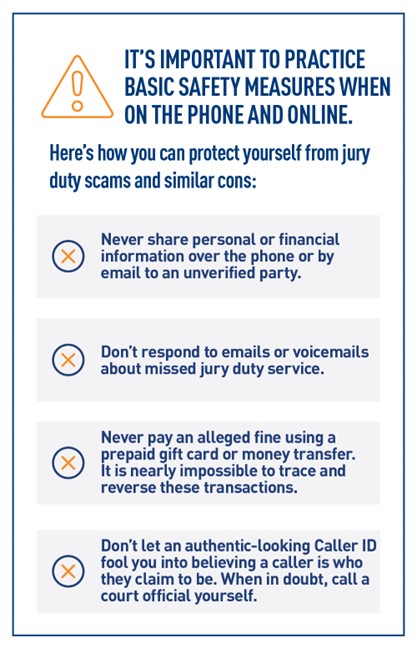
Security
Beware of jury duty scams
Jury duty is a civic responsibility for U.S. citizens that enables the courts to serve justice fairly and efficiently. Unfortunately, some scammers are using jury duty as a cover for targeting innocent victims. The scammers rely on the victims’ limited information about the process to convince them they have committed a crime. Unfortunately, the scammers are often successful at pulling off this ruse. To prevent yourself from being next, here are some things you need to know about jury duty scams.
How the scam plays out
Like so many other scams, the jury duty ruse begins with an urgent phone call or email. The scammer impersonates a court or law enforcement official, such as a U.S. Marshal or a sheriff’s officer, and claims the victim has failed to show up in court for jury duty. They threaten the victim with immediate arrest unless they pay a hefty fine via credit card, prepaid debit card or money transfer.
Another method the scammer might use involves asking for personal information, like a Social Security number, for the alleged purpose of checking court records. The scammer can then use this information to steal the victim’s identity.
In either scenario, the story about a missed jury duty summons is completely fabricated, leaving the target conned and defrauded.
How to spot the scam
Technology has made it more challenging to spot a scam that plays out over the phone or by email. Jury duty scammers often use sophisticated devices to spoof the phone’s Caller ID and make it appear as if they’re actually calling from a courthouse or police department. Emails can also appear to be sent from a legitimate source. Fortunately, with some basic information, you can learn to spot jury duty scams and protect yourself from being the next victim.
Here’s what you need to know about jury duty summonses:
• Failure to appear for jury duty is not grounds for immediate arrest.
• Federal courts do not require anyone to provide sensitive information, like Social Security or credit card numbers, over the phone.
• Jury duty summonses and notices about failure to appear for a court date are sent through the USPS mail.
• Citizens are not required to pay a fine for missing jury duty without first being given the opportunity to explain themselves in court.
• Court officials will never demand payment over the phone or via specific payment methods.

If you’ve been targeted
If you believe you’re being targeted with a jury duty scam, you can take action to prevent being victimized further.
First, reach out to relevant federal, state or local courts to verify that you have not actually missed a jury duty summons. They will likely confirm your suspicions about the scam.
Next, do not engage with the scammer. If the scammer left a callback number, ignore it. Delete all emails or texts from the scammer and mark them as spam.
Finally, notify your local courts and law enforcement agencies in your area. You can let your friends know to beware of the circulating scam as well.
Jury duty is a civic responsibility for most Americans.
Don’t let scammers use it as a cover to trick you out of your money. Stay alert and stay safe!
Recommended Articles
Subscribe to our blog
Fill out the form below to sign up for our blog.







